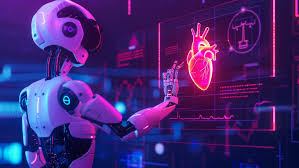Artificial Intelligence (AI) has made significant strides in various industries, and healthcare is no exception. From diagnosis to treatment, AI’s influence is reshaping the way we approach health issues. With the power of machine learning, deep learning, and data analytics, AI is making healthcare smarter, faster, and more personalized. In this article, we’ll explore how AI is affecting health issues, from improving patient care to revolutionizing research and clinical outcomes.
1. Improved Diagnostics and Early Detection
One of the most transformative impacts AI is having on healthcare is in the realm of diagnostics. AI systems can analyze medical images (like X-rays, CT scans, MRIs, and ultrasounds) much faster and often more accurately than humans. For example, algorithms trained with vast amounts of medical data can detect early signs of diseases like cancer, heart conditions, and neurological disorders that might be missed by a human eye.
AI-based diagnostic tools have proven to be highly effective in identifying conditions like breast cancer, lung cancer, and even skin cancer through image recognition. Early detection leads to better outcomes as treatment can be started sooner, improving survival rates and minimizing risks.

2. Personalized Treatment Plans
AI’s ability to analyze patient data, including genetic information, lifestyle habits, and medical history, is paving the way for more personalized treatment plans. AI can help doctors tailor medications and treatments specifically to a patient’s unique characteristics, improving the chances of successful outcomes.
For example, in oncology, AI algorithms can analyze genetic mutations in cancer cells and suggest the most effective treatment protocols. This helps reduce the trial-and-error process traditionally associated with cancer therapies and allows for more targeted, precise interventions.
3. Predictive Analytics for Preventative Healthcare
AI is also playing a significant role in preventive medicine. Through predictive analytics, AI can forecast potential health risks before they become serious. For instance, machine learning models can predict the likelihood of a patient developing conditions like diabetes, hypertension, or even mental health issues based on their current health data and lifestyle choices.
This proactive approach to healthcare enables doctors to intervene earlier, offering lifestyle recommendations, medications, or regular monitoring, which can reduce the chances of serious complications down the road. Read more about Pain Management with AI.
4. Streamlining Administrative Tasks
Healthcare professionals spend a significant amount of time on administrative tasks, such as scheduling appointments, managing patient records, and processing insurance claims. AI tools are automating many of these time-consuming processes, allowing healthcare providers to focus more on patient care.
Natural Language Processing (NLP) and machine learning are helping automate clinical documentation and streamline administrative workflows. AI-powered chatbots are also being used to assist with patient inquiries, appointment bookings, and general administrative functions, thus reducing the strain on medical staff.
5. Drug Discovery and Development
AI is revolutionizing the pharmaceutical industry by significantly speeding up the drug discovery and development process. Traditionally, discovering new drugs can take years and involves high costs. However, AI is capable of analyzing vast amounts of medical data to identify potential drug candidates more quickly and accurately.
For example, AI algorithms can analyze genetic, clinical, and molecular data to predict which compounds may have therapeutic effects, significantly reducing the time it takes to bring new drugs to market. This is especially important for addressing rare diseases or emerging health threats, such as pandemics.
6. Robotic Surgery and AI-Assisted Procedures
Robotic surgery, powered by AI, is becoming more advanced, making surgeries safer and more efficient. AI-enhanced robots are capable of performing precise and minimally invasive procedures with great accuracy, leading to shorter recovery times, less pain, and fewer complications for patients.
For instance, in the field of orthopedics, AI is being used to assist with joint replacement surgeries, ensuring that prosthetics are fitted perfectly and minimizing the risk of complications. In neurosurgery, AI-assisted robotic systems can help surgeons navigate delicate areas of the brain with enhanced precision.
7. Telemedicine and Remote Monitoring
AI is also playing a significant role in the growing field of telemedicine, where healthcare services are provided remotely through digital platforms. With AI-powered tools, doctors can analyze patient data collected through wearable devices or home monitoring systems, enabling continuous care without the need for patients to visit the hospital.
For chronic conditions like diabetes, AI-powered sensors can track vital signs and send alerts to both patients and healthcare providers if there are any concerning changes. This technology is particularly beneficial for patients who live in remote areas or those with mobility issues, ensuring they receive timely care.
8. Mental Health and AI Support
Mental health issues are increasingly being recognized as a major health concern worldwide. AI is providing new ways to diagnose, monitor, and treat mental health disorders, such as depression, anxiety, and PTSD.
AI chatbots and virtual mental health assistants are being used to provide immediate, non-judgmental support to individuals experiencing emotional distress. These tools use natural language processing to engage with patients, offering coping mechanisms, relaxation exercises, and even connecting them to professional therapists if needed. AI can also help identify patterns in behavior that could signal a mental health crisis, allowing for earlier intervention.
9. Ethical Concerns and Challenges
While AI is transforming healthcare for the better, it does come with its share of challenges and ethical concerns. Privacy issues are at the forefront, as AI systems rely on vast amounts of sensitive patient data. Ensuring that AI is used ethically and that patient data is protected is essential to maintaining trust in the healthcare system.
Moreover, there are concerns about AI’s potential to replace human jobs in healthcare. While AI can assist doctors, nurses, and other healthcare professionals, it’s unlikely to fully replace human interaction and expertise. The goal should be for AI to complement human efforts rather than replace them.
Conclusion
Artificial Intelligence is undoubtedly revolutionizing healthcare, offering innovative solutions for diagnosing diseases, developing personalized treatment plans, preventing illnesses, and improving patient care. As AI technology continues to evolve, we can expect even more breakthroughs in healthcare, ultimately leading to healthier lives and a more efficient healthcare system. However, as we move forward, it’s crucial to address the ethical considerations and ensure that AI is used responsibly to maximize its potential for good.
By combining the power of AI with the compassion and expertise of healthcare professionals, we are on the path toward a new era of healthcare that is more precise, accessible, and personalized than ever before.
